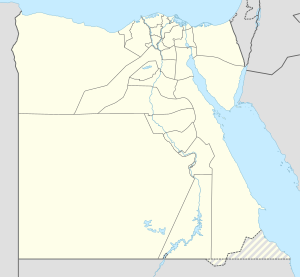Tell El Kebir
|
Tell El Kebir التل الكبير |
|
|---|---|
| Location in Egypt | |
| Coordinates: 30°32′44″N 31°46′41″E / 30.54556°N 31.77806°ECoordinates: 30°32′44″N 31°46′41″E / 30.54556°N 31.77806°E | |
| Country |
|
| Governorate | Ismailia |
| Time zone | EST (UTC+2) |
| • Summer (DST) | +3 (UTC) |
Tell El Kebir (Arabic: التل الكبير lit."the great mound") is 110 km north-north-east of Cairo and 75 kilometres south of Port Said on the edge of the Egyptian desert at the altitude of 29 m. Administratively, it is a part of the Ismailia Governorate.
In the ancient times the city of On (modern Matariyah) mentioned in Genesis 41:45 was identified by some as located south-west of the mound, which according to the Egyptian legend was the first place where cotton was cultivated.
The location is famous for the Battle of Tell El Kebir which was fought between the Egyptian army led by Ahmed 'Urabi and the British military. The ancient ruins of On were fortified into an entrenched camp by the Egyptian troops.
The Egyptian troops of Ibrahim Pasha captured the city of Jaffa and its environs following a battle with the forces of the Ottoman Empire in 1832. Though Egyptian rule over this area continued only until 1840, Egyptian Muslims settled in and around Jaffa, founding among others the village of Abu Kabir. Many of the Egyptians who populated it came from Tell El Kebir and named it for their hometown.
During the Gallipoli landings and the Sinai and Palestine Campaign of the First World War, Tell El Kebir was a training centre for the First Australian Imperial Force reinforcements, No 2 Australian Stationary Hospital, and also a site of a large prisoner of war camp. Some 40,000 Australians camped in a small tent city at Tell El Kebir of six miles in length. A military railway was eventually constructed to take troops from the camp to their vessels in Alexandria and elsewhere for embarkation to Gallipoli landings.
...
Wikipedia

